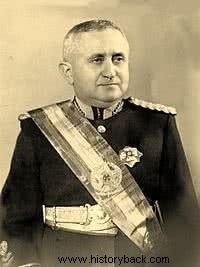Eurico Gaspar Dutra, The 14th president of Brazil, he ruled the country from 1946-1951 after the deposition of President Getúlio Vargas by a military coup.
His government was characterized by the persecution of communists, prohibition of gambling and rapprochement with the US.
 Eurico Gaspar Dutra, 14th president of Brazil.
Eurico Gaspar Dutra, 14th president of Brazil.
Dutra Government
Domestically, it was up to the Dutra government to promulgate a Constitution that replaced the one granted by Getúlio Vargas in 1937. The new Constitution of 1946 guaranteed individual liberties and abolished the death penalty.
Dutra also established a conservative policy by banning the existence of the Communist Party, which became illegal.
The economy of the government of Eurico Gaspar Dutra was characterized by the wage squeeze, the construction of highways and the burning of foreign exchange reserves.
He instituted the SALTE plan with the aim of bringing improvements in the areas of Health, Food, Work and Energy. However, the project failed to obtain funding and did not materialize.
In international relations, the United States played a fundamental role in foreign policy, consolidating exports and cultural exchange with this country.
He left the presidency in 1951. His candidate, Cristiano Machado, lost the elections to former president Getúlio Vargas.
Biography
Eurico Gaspar Dutra was born in Cuiabá, on May 18, 1883.
He entered the Praia Vermelha Military School in Rio de Janeiro in 1904. During the 1920s he fought the lieutenants both in Rio de Janeiro in the Copacabana Fort Revolt and in São Paulo in 1924.
From 1932 onwards he was close to President Vargas thanks to his fight against the constitutionalist movement that attacked the federal government. He also played an important role in suppressing the Communist Intent in 1935.
He definitively enters the Vargas government, as Minister of War, in 1936.
During World War II he defended Brazil's participation on the side of the Axis powers. Despite this position, General Eurico Gaspar Dutra was responsible for organizing the Brazilian Expeditionary Force (FEB), sent to fight in Italy.
At the end of the conflict, when the Vargas government was losing support, Dutra was chosen by the opposition to be the presidential candidate. Vargas would be overthrown in a military coup that ensured Dutra's election.
After leaving the government, Dutra would still retain his influence in the military and was part of ARENA during the military regime.
He passed away in Rio de Janeiro on June 11, 1974.
Read more:
- Era Vargas
- Brazil in World War II
- Consequences of World War II
- Death Penalty
